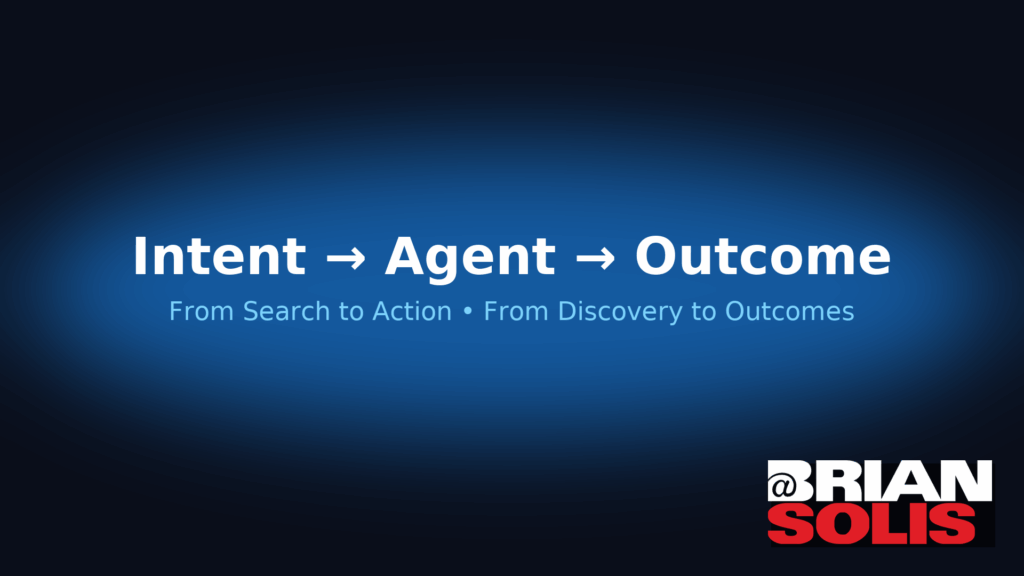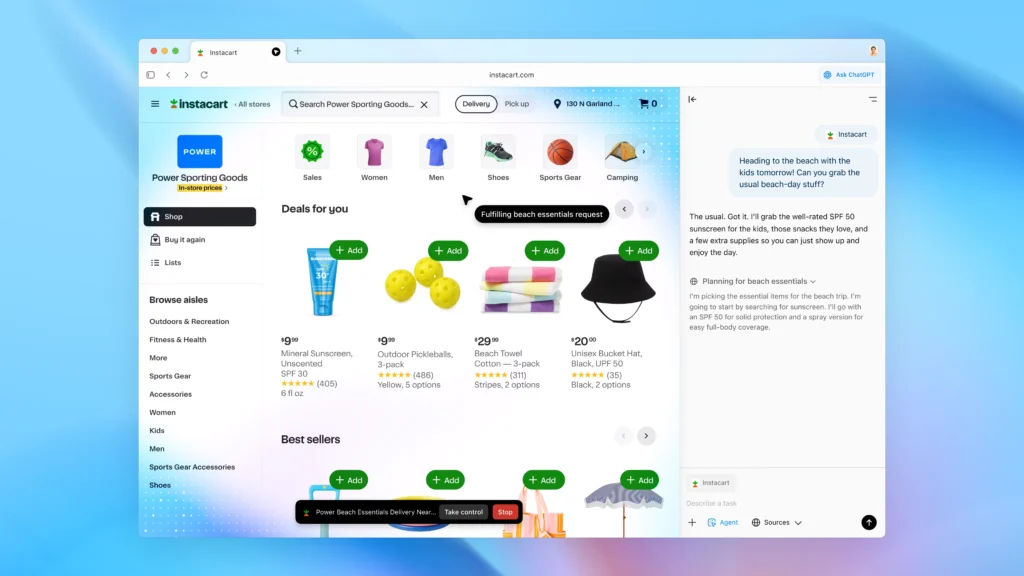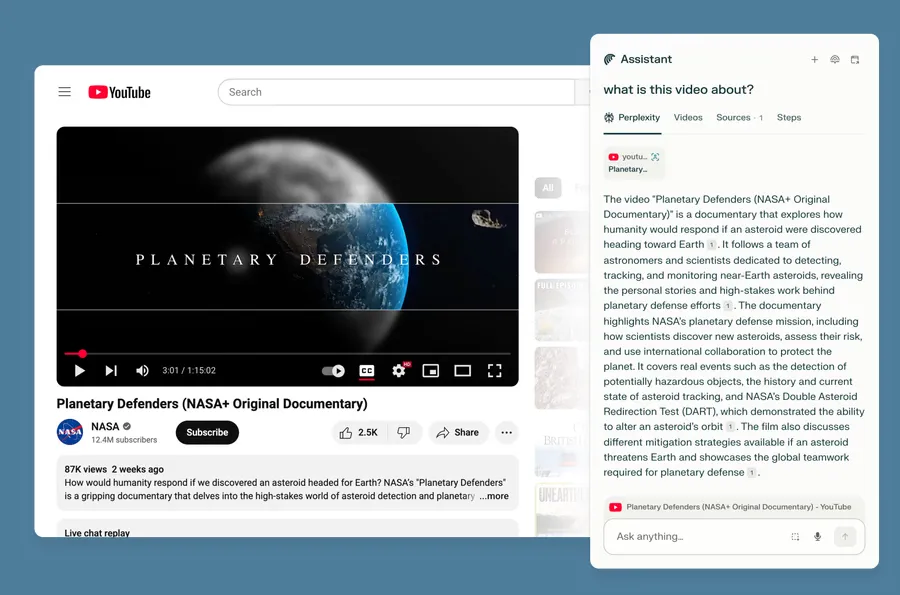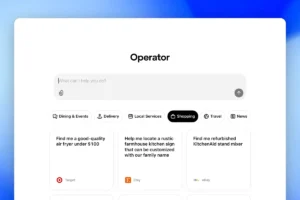
I haven’t written about a browser since the early 2000s.
We are about to change how we discover, decide, and do things on the web again. And the very purpose of the web is shifting. For decades, the web was built for humans clicking links. The next era is being built for agents completing tasks. I’ll unpack that bigger shift in a follow-up, but first, let’s look at what’s here now and why it matters.

Two AI-Native Browsers Draw a New Line
OpenAI’s ChatGPT Atlas and Perplexity’s Comet are not “browsers” in the classic sense. They introduce a new interaction model that collapses research and execution into a single flow.
- Atlas puts ChatGPT inside the browser. You don’t type keywords and open tabs. You state the outcome you want and Atlas searches live, reasons across pages, and then acts. Research, shopping, travel, form fills, reservations. The result is less tab juggling and more finished work.
- Comet turns every page into an interactive surface. You can highlight anything, ask for counterpoints, follow tangents, and then act without losing context. It turns curiosity into momentum.

Both serve as personal assistants and agents.
The plot thickened when Microsoft shipped a nearly identical AI experience in Edge days after Atlas. That signals where platforms are going: agentic browsing becomes intentional.
This is the challenge and the opportunity. We’re moving from a web of browsing and transactions to a web of discovery, action, and outcomes.
The Shift from Keywords, Links, and Pages to Discovery, Decisions, and Actions
For 20+ years the browser was a window. You typed a query, opened a dozen tabs, skimmed, copied, pasted, filled forms, and stitched the journey together yourself. The final mile was do-it-yourself.
In the agentic model, the browser becomes co-pilot and flight controller. You express intent, it gathers sources, weighs options, and executes. It returns a plan, a basket, a booking, or a brief. Fewer tabs. Faster decisions. More outcomes.
- Atlas bakes ChatGPT into the browsing loop.
- Comet fuses Perplexity search with in-page reasoning.
- Edge’s new AI mode makes “do the task” a default pattern.
This introduces a web that works for you.
Field notes: stress-testing Atlas in New York
Ahead of a trip to New York, I asked Atlas for the hottest restaurants, logged in where it suggested, set windows for lunch and dinner plus party size, and watched it research and attempt to book. When it couldn’t, it added me to waitlists and notifications. End-to-end tasking without a spreadsheet of tabs. I’ll post where I landed on IG.
Watch video here.
I’ve found reasons to use both Atlas and Comet, and I’m still learning the nuances. What’s clear: behavior shifts to intention to action to outcomes. People will expect planning, comparison, and checkout in one flow. Hands on the wheel, but less time on the road.
So what actually changes?
1) Discovery compresses. We move from “find pages” to “produce outcomes.” Tasks, not queries, become the unit of value.
2) Trust becomes a ranking signal. Agents will privilege content with provenance, recency, and clear policies over thin pages and click-bait.
3) Design tilts toward machine readability. If your information can’t be parsed, reasoned over, and acted on by an agent, it risks being sidelined.
SEO isn’t Dead, but the SEO Playbook is…
Classic SEO was written for crawlers and clicks. The next play is AEO: AI Experience Optimization. Design your content and commerce so agents can understand, trust, and transact. That’s where the web is going. Less a web for human consumption alone and more a web designed for LLMs and agentic processing.
What to do now
- Make data callable. Expose inventory, pricing, availability, and policies through secure, well-documented APIs.
- Make knowledge machine-readable. Use structured schema, product graphs, sources, timestamps, authorship, and update cadence.
- Create action surfaces. Provide booking endpoints, carts, quotes, claims, and warranty flows so agents complete tasks, not just summarize pages.
- Publish agent briefs. Maintain concise, up-to-date fact sheets and constraints that LLMs can ingest and execute against.
How companies win from here
- Ship APIs first. If an agent can’t call it, customers won’t complete it.
- Structure everything. Treat metadata like a product.
- Prove trust. Transparent sourcing, policies, and recency become the new PageRank.
- Measure outcomes, not visits. Track assistance rate, time-to-decision, completion, and repeat runs.
- Pilot an agentic journey. Pick one flow, whether it’s returns, warranty, claims, B2B quoting, and rebuild it for “state intent, decide, do, outcome.”
What This Means for Business Leaders
Agentic browsing is not a feature race, well…it’s a race toward shifting how you, and namely agents use the web. Essentially, it’s a shift in how value is created and captured online. When tasks and outcomes, not search and clicks, define success, the winners will be discovered and become part of the solution or outcome..
We’re moving from pages to progress. From browsing to doing. From ad-driven clicks to agent-driven completions.
It’s time to build for the agentic age and to learn when and how to let agents navigate and execute on your behalf.
Maybe now, we can finally close those tabs. We’ll see…I counted 30 open tabs as I finished this newsletter. 😅
Read Mindshift | Book Brian as a Speaker | Subscribe to a Quantum of Solis





If agentic browsers become the primary interface to the web, how should businesses rethink ownership of the customer relationship when discovery, Pips NYT comparison, and execution are increasingly mediated by third-party agents rather than direct brand interactions?
Some work, some don’t, but each teaches you something. Drift Hunters encourages this by never punishing curiosity. The road remains open, and the car remains honest.